Discover The Most Important Question
The Most Important Question

The Most Important Question
Author: Important, Not Important
Subscribed: 3,328Played: 56,776Subscribe
Share
© Important, Not Important Inc 2026
Description
Science for people who give a sh*t.
Want to feel better AND unf*ck the world? The 6-time Webby nominee delivers deep conversations with the world's smartest people (scientists, doctors, CEO's, farmers, and more!), and digestible news updates every single week, to help you answer the world's most important question: What can I do?
We're talkin' clean energy and coral reefs, COVID vaccines and pediatric cancer research, clean water and carbon capture tech, asteroid deflection and artificial intelligence ethics.
"A vital service in an era where important truths, outright fiction and mere trivia all compete for your attention.” - Craig Mazin, creator, writer, and executive producer of HBO's Chernobyl
Hosted by Quinn Emmett
Want to feel better AND unf*ck the world? The 6-time Webby nominee delivers deep conversations with the world's smartest people (scientists, doctors, CEO's, farmers, and more!), and digestible news updates every single week, to help you answer the world's most important question: What can I do?
We're talkin' clean energy and coral reefs, COVID vaccines and pediatric cancer research, clean water and carbon capture tech, asteroid deflection and artificial intelligence ethics.
"A vital service in an era where important truths, outright fiction and mere trivia all compete for your attention.” - Craig Mazin, creator, writer, and executive producer of HBO's Chernobyl
Hosted by Quinn Emmett
447 Episodes
Reverse
If our mission is to help people, everyone, answer the most important question, what can I do? Then at some point we need to talk to the people who help really wealthy people, help people.So today's question, what can I do about high net worth philanthropy? And look, hey, maybe you're among the vast majority who just heard that and you're like, well, this one doesn't apply to me, but hear me out. We have some of the worst billionaires of all time, but if billionaires are gonna continue to exist, we all need to have a good idea of how we can push them to distribute their resources more effectively and ASAP.And I truly do believe that among high net worth individuals, there are some, especially younger folks that are dying to do exactly that. So whether that is you or definitely not you, or maybe you are adjacent to someone like that, I think there's something for everyone here.My guest today is Sharon Schneider. Sharon is the Founder of Integrated Capital Strategies LLC, a consulting firm that helps founders and family offices create positive social change using an expanded toolbox of resources and strategies that spans the return spectrum from grants to market rate investments.She's also the author of Handbook for An Integrated Life: A Practical Guide for Aligning Your Everyday Choices with Your Internal Compass, a number one new release on Amazon that helps individuals live into their values the same way her consulting helps business owners and family offices. Sharon previously served as the Executive Director of the Telluray Foundation, the Founding Director of the Walton Personal Philanthropy Group, and the co-founder and CEO of Moxi Jean, a for-profit social enterprise that was acquired by Schoola in 2015. Sharon was named a Colorado Governor's Fellow in 2022 and in 2024 was named an Aspen Institute Finance Leader Fellow, and a member of the Aspen Global Leadership Network.Again, I really do think there's something for everyone here. This is a really important conversation in a time of growing inequality. We gotta help more people.-----------Have feedback? Tweet us, or send a message to questions@importantnotimportant.comNew here? Get started with our fan favorite episodes at podcast.importantnotimportant.com.Find every action recommended in The Most Important Question here: www.whatcanido.earth-----------INI Book Club:Handbook For An Integrated Life by Sharon SchneiderThe Purpose of Capital by Jed EmersonFind all of our guest recommendations at the INI Book Club: https://bookshop.org/lists/important-not-important-book-clubLinks:li...
Hi! It's Quinn. We have huge plans for 2026, and we need your help.So we're running the biggest discount on an Important Membership that we've ever run, and will ever run, probably.Right now it's $30/year. On January 1st, it'll be $50/year, and it's never going back.So right now you can go to ImportantMembership.com and lock in $30/year forever, and we'll all be in a better place. You even get a free 30 day trial. Huzzah.Here's a fun fact: 95% of people who joined are still Members. That's crazy. You will not regret it, and you even get stickers.Members pay -- directly -- for our people, our software, our data, and when we can afford it -- which we really need to be able to afford more often -- marketing and advertising to get our work and the app in front of like 100 times more people.You get bonus episodes from both of our podcasts, everything we make, like Life Finds A Way and The Science of Fiction, and all of it ad-free, and a place to track and share your actions with thousands of other people in What Can I Do? It's so great.So that's it -- the price is going to basically double on January 1st, but you can lock in a Membership right now at $30/year, with a 30 day free trial.Go to ImportantMembership.com right now, we take Apple Pay, it takes 10 seconds. Thank you.
Hey friends, I want to talk about something big. Change the actual world big, because the world won't unfuck itself, as we all know. We are joining podcasts across the planet for Pods Fight Poverty, a campaign directly supporting our good friends at Give Directly. Now, if you've been with us since episode 116, which feels like a thousand years ago, you'll remember when we asked one of the most deceptively simple, world altering questions ever.Why is just giving people money the most effective way to help them change their lives and maybe even end global poverty altogether? To crack that open I had Caroline Teti and Michael Faye on the show, two people who've spent years with Give Directly, knee deep in data and logistics and lived experience, my favorite combination of things, and guess what the answer turned out to be? People are the experts on their own lives. You are. So why aren't they? Different people need different things on different days. So if you want them to get exactly what they need, you give them the resources to choose cash directly, and that's what Give Directly does.No middlemen, no guessing, just trusting other humans with the dignity and agency we would expect and that they deserve. Yeah, wild idea. It works. It works better than almost anything else we've tried. So here's the part where you come in. None of us can erase global poverty by ourselves. Again, that's our whole tagline. But literally, any one of us can lift one person out of poverty, today, right now. So for Pods Fight Poverty, if you can head to givedirectly.org/important and chip in.That's givedirectly.org/important. And look to take it even further, my wife and I already personally contribute to Give Directly every year, every month actually, which is the best way to support a group like this, by the way.And thousands of you all do too. I'm gonna step it up and will personally match the next $5,000 in donations when you use our link, which again is givedirectly.org/important. So let's do it. And to get you in the spirit, we're gonna revisit our conversation right now with Teti and Michael. It's funny, it's hopeful, it's deeply nerdy, and it'll remind you why this work matters every single day. Thanks as always for giving a shit. -----------Have feedback or questions? Tweet us, or send a message to questions@importantnotimportant.comNew here? Get started with our fan favorite episodes at podcast.importantnotimportant.com.Take Action at www.whatcanido.earth-----------INI Book Club:“The Biggest Bluff” by Maria Konnikova“The Art of Reading Minds” by Henrik FexeusFind all of our guest recommendations at the INI Book Club:
What if talking about menopause out loud was as normal as talking about sports scores or school pickup? Imagine it in movie plots, in your group chat, at the clinic, and on the campaign trail because when we name what's happening in our bodies, three things can follow: better care, better research, and better policy. Normalizing the conversation around something that's gonna happen to half the population isn't oversharing. It's infrastructure. This is how we're gonna get appointments that move the needle for people. This is how we're gonna get workplace benefits that actually matter and research dollars that finally match the need, especially for those most impacted and least studied. So what can I do to make menopause a public everyday conversation?My guest today is Jennifer Gerson. She's a journalist at the 19th, one of my favorite publications, and the author of their new menopause newsletter. Jennifer blends sharp reporting with practical scripts, and memes, how to talk to your doctor or your partner or your teen or someone in HR, and maybe your elected representatives too, because you know we love that.So that this thing that's been so intensely private and understudied, on purpose, becomes public. And so progress compounds. This one can definitely change the conversation in your home and far, far beyond it.-----------Have feedback or questions? Tweet us, or send a message to questions@importantnotimportant.comNew here? Get started with our fan favorite episodes at podcast.importantnotimportant.com.Take Action at www.whatcanido.earth-----------INI Book Club:The Day The Crayons Made Friends by Drew DaywaltFind all of our guest recommendations at the INI Book Club: https://bookshop.org/lists/important-not-important-book-clubLinks:Jennifer is listening to: the new Snocaps album, and all the Zombies soundtracksFind a healthcare provider specializing in midlife women's health using resources at The Menopause SocietySubscribe to Jennifer's menopause newsletter at the 19thFollow us:Subscribe to our newsletter at importantnotimportant.comSupport our work and become a Member at importantnotimportant.com/upgradeGet our merchFollow us on Twitter:
If the American Revolution was, as Ken Burns put it, the biggest event since the birth of Christ, then there's probably never been a better time to explore and drastically expand on why it happened, who was involved, and what it set us up for than right now. My guest today again is David Schmidt.David is the producer and co-director, along with Ken Burns and Sarah Botstein, of American Revolution, a six-part, 12-hour series premiering on PBS this November. David is a childhood friend, but two decades after he and I played Nintendo in his basement, he began working with Florentine Films as a researcher and apprentice editor, beginning with The Roosevelts in 2014, where he also supervised the documentary's seven-episode script. David's research on the Vietnam War in 2017 won him the Jane Mercer Footage Researcher of the Year Award, and he also worked closely on that project with writer Geoffrey C. Ward and helped coordinate post-production. With Burns, Schmidt also produced the two-part biography Benjamin Franklin in 2022 for PBS. I can't wait for you to hear this discussion. I think it pairs really nicely with our conversation with Clint Smith and can't wait for you to see this piece. -----------Have feedback or questions? Tweet us, or send a message to questions@importantnotimportant.comNew here? Get started with our fan favorite episodes at podcast.importantnotimportant.com.Take Action at www.whatcanido.earth-----------INI Book Club:This Here Is Love by Princess Joy L. PerryThe Sellout by Paul BeattyFind all of our guest recommendations at the INI Book Club: https://bookshop.org/lists/important-not-important-book-clubLinks:Watch the 12-part series, The American Revolution, on PBS https://www.pbs.org/kenburns/the-american-revolutionRead The American Revolution book by Ken Burns and Geoffrey C. Ward https://bookshop.org/a/8952/9780525658672David is listening to: The American Revolution playlist, Hammond Song by The Roches, and The Shape of Water soundtrackFollow us:Subscribe to our newsletter at importantnotimportant.comSupport our work and become a Member at importantnotimportant.com/upgradeGet our a...
I've recorded hundreds of conversations with incredible people working on the front lines of the future. People who've asked the most important question: what can I do? Who found their answer and followed it. But for today's conversation, we're going back to the front lines of the past because the past can tell us a whole hell of a lot about today and how tomorrow might go.But only if we tell the full story of how we got here, about who got us here, about how my great-great-grandparents got here. And how my grandma got here fleeing the Nazis, and how millions of Africans were forcibly brought here, over 35,000 trips across the middle passage over almost 300 years. The full story of the choices we made then, which was not so long ago, and continue to make now about wars and heritage and bondage and family and land and more.And how, if we can break from the stories we've been told and continue to tell ourselves to choose history over nostalgia, to choose facts over memory and infinite disinformation on demand, we can make different choices. My guest today is Clint Smith. Clint is the number one New York Times bestselling author of How the Word Is Passed: A Reckoning With the History of Slavery Across America, he's the winner of the National Book Critic Circle Award for nonfiction, the Hillman Prize for book journalism, the Stowe Prize, the Dayton Literary Peace Prize, and was selected by the New York Times as one of the 10 best books of 2021.And now in 2025, the Young Reader's Edition has just come out and it is wonderful. Clint is also the author two books of poetry, the New York Times bestselling collection Above Ground, as well as Counting Dissent. Both poetry collections were winners of the Literary Award for Best Poetry Book from the Black Caucus of the American Library Association, and both were finalists for NAACP Image Awards.Clint is a staff writer at The Atlantic and he has received fellowships for the Andrew W. Mellon Foundation, New America, the Emerson Collective, the Art for Justice Fund, Cave Canum, and the National Science Foundation. His essays, poems, and scholarly writing have been published in The New Yorker, New York Times Magazine, the New Republic, Poetry Magazine, the Paris Review, the Harvard Educational Review, and elsewhere. Clint is a former National Poetry Slam Champion, and the recipient of the Jerome Jay Shestack Prize from the American Poetry Review.-----------Have feedback or questions? Tweet us, or send a message to questions@importantnotimportant.comNew here? Get started with our fan favorite episodes at podcast.importantnotimportant.com.Take Action at www.whatcanido.earth-----------INI Book Club:How The Word Is Passed by Clint SmithHow The Word Is Passed Young Readers Edition by Clint Smith, Adapted by Sonja Cherry-PaulFind all of our guest recommendations at the INI Book Club: a...
Chronically parched is not something anyone in this country or anywhere should ever have to feel, but here we are. So how are towns and states making clean water more affordable, reliable, and less controversial? 'cause remember, it's fucking water. Look, you might feel like you're giving it all you got but when you look around things are a little dark out there. So you, our listeners and readers and viewers and users, whatever, across the world, want and demand more examples of fight and progress you can see and touch and feel, taste, and in these conversations, in this special series, in our partnership with our best friends that Run For Something, we're gonna do that.Each of these episodes features two guests both sourced from the Run For Something pipeline and graduating classes. First, I'll introduce one young elected official at the state or local level who has actually made real measurable progress on an issue facing more Americans than ever before, something that you'll notice.And then in the same episode, I'll introduce a bright-eyed candidate who's currently running for a state legislature for mayor, for city council, or for school board, who is similarly hellbent on attacking the same issue in their own hometown or their state. And for all you know, one of these could be in yours or near yours, or just have lessons that apply to yours.Today our topic: drinking water. You'd think it wouldn't be complicated or controversial, but remember folks, bad guys are real.Introducing our incumbent, State Rep Laurie Pohutsky is a Michigan born millennial microbiologist serving her fourth term in the Michigan House of Representatives where she serves on the Oversight Committee and is the Chair of the Progressive Women's Coalition. Laurie sponsored legislation that became Michigan's Clean Energy and Jobs Act of 2023. She's the co-sponsor of legislation to make polluters pay, which is always great, and to amend Michigan's Natural Resources and Environmental Protection Act, which focuses on environmental cleanup standards and procedures, which would be stellar since, as you know, the EPA has, basically been abolished.Our candidate, Denzel McCampbell is a fine, young community advocate and native Detroiter, living and running for Detroit City Council District Seven. Denzel was born and raised in the east side and is a graduate of Michigan State University. He is dedicated to public service, to fighting day in and day out to increase access to democracy and representation for marginalized groups. He believes the Detroit city government should be a responsive government that uses its resources to ensure that every neighborhood is well resourced and that every resident is able to have the fundamentals. Two amazing humans fighting for water, and fighting for everything else. Let's find out what it means for their hometowns, for Michigan, and for yours.-----------Have feedback or questions? Tweet us, or send a message to questions@importantnotimportant.comNew here? Get started with our fan favorite episodes at podcast.importantnotimportant.com.Take Action at www.whatcanido.earth-----------INI Book Club:
I think we can all agree that kids shouldn't go hungry ever really, but especially at school. You might feel right now like you are giving it everything you got, but when you look around, things feel kind of dark out there. So you, our listeners and readers and viewers across the country and across the world want, demand, need more examples of fight and real progress you can actually see and touch and feel and taste. And in these conversations, in partnership with our best friends at Run For Something, we're giving you exactly that. Each of these episodes features two guests both sourced from the Run For Something pipeline and graduating classes.They are the next generation of American leaders. First, I'll introduce one young elected official at the state or local level who's made real measurable progress on an issue facing more Americans than ever before, like food, and then in the same episode, I'll introduce a bright-eyed candidate currently running for state legislature, mayor, city council, or like today's guest, school board, who's similarly hellbent on attacking the same issue in their own hometown or state.And it matters because for all you know, it could be yours next. So first up again, today, our topic: school lunches. School breakfasts, after school meals for students and teachers and parents and caregivers and whoever needs it. Because without food teachers can't work. None of us can learn.Our incumbent, Jessica Spillers is a mom, a social worker, and an advocate with 12 years of experience in community mental health, the criminal justice system, and the government sector. She currently serves on the school board in Manchester, New Hampshire, and was named the New Hampshire Young Democrat of the Year in May, 2024. Jessica recently announced enough is enough and decided to run for Mayor of Manchester. Our candidate, Talia Rodriguez is running for the Buffalo Board of Education West District to be the first Latina on the board. She's a mom, a nonprofit development professional, and community advocate. She holds a law degree from the University of Buffalo and a Master's in Public Policy. She has extensive experience advancing educational equity, food justice, and bilingual programs. Talia is committed to uplifting diverse families, supporting student-centered policies and creating safe inclusive schools that meet the needs of all children.I'm so excited to introduce you to these two amazing humans who are fighting for kids to have food. Let's find out what it means for their hometowns and for yours.-----------Have feedback or questions? Tweet us, or send a message to questions@importantnotimportant.comNew here? Get started with our fan favorite episodes at podcast.importantnotimportant.com.Take Action at www.whatcanido.earth-----------INI Book Club:Creepy Pair of Underwear! by Aaron ReynoldsThe Bible and The Complete Poems of Anna AkhmatovaFind all of our guest recommendations at the INI Book Club: a...
Maybe you feel like you're already giving it all you've got. You look around, and things are tough out there. You, our listeners and readers and viewers and users across the country and across the world, you're demanding more examples of fight and progress you can actually see and touch and feel, and in these conversations, in this series, in partnership with our very best friends at Run For Something, we're gonna give you exactly what you asked for.Each of these episodes features two guests, both sourced from the Run For Something pipeline and graduating classes, the next generation of leaders. In each episode, first, I'll introduce one young elected official at the state or local level who's made real measurable progress on an issue facing more Americans than ever before.And then in the same episode, I'll introduce a bright-eyed candidate currently running for a state legislature or Senate, governor, mayor, city council, or school board, who is similarly hellbent on attacking the same issue in their own hometown or state. First up today, our topic: gun control. As The Onion posts once a month, there's no way to prevent this, says the only nation where this regularly happens. But there are ways to prevent it.Not just school shootings or homicides or suicides or even accidental shootings in the home when a gun and ammo aren't stored safely or even fucking stored at all. We just need people in office who aren't cowards because we know what works. Our incumbent is Missouri State legislator, Ray Reed, endorsed by Run For Something in 2024. Ray was just in the news for a bold sit-in protest, refusing to leave the floor of the Missouri house for over a hundred hours after Republicans there attempted to convene a special session and push through redrawn legislative maps at the behest of Donald Trump. Ray is a St. Louis native, and he brings a wealth of experience in Missouri politics, having collaborated with notable democratic leaders like former Governor Jay Nixon and Senator Claire McCaskill.Next I'll talk to our candidate, Jazz Hampton. Jazz is running for Mayor of Minneapolis because he loves the city. It's not just where he lives. It is who he is. He is not only a lifelong Twin Cities resident, and a husband there, he's the father of three Minneapolis public school students. He has been an attorney there, an educator there, and a social justice entrepreneur.He has freed the wrongfully convicted. He has worked on advanced, affordable housing, protected civil rights, and created safer communities. Now he's ready to bring fresh leadership and unite Minneapolis after a hell of a decade. Two amazing humans fighting for gun control in very different places, in the only nation where this regularly happens. Let's find out what it means for their hometowns and yours.-----------Have feedback or questions? Tweet us, or send a message to questions@importantnotimportant.comNew here? Get started with our fan favorite episodes at podcast.importantnotimportant.com.Take Action at www.whatcanido.earth-----------INI Book Club:107 Days by Kamala HarrisDie With...
Things are a little tough out there. So you, want, no need, more examples of fight and progress you can actually see and touch and feel. And in these series of conversations, in partnership with our best friends at Run for Something, we are giving you exactly what you asked for.Each episode features two guests, both sourced from the Run for Something pipeline and graduating classes, the next generation of American leaders. First, I'll introduce one young elected official at the state or local level who's made real, measurable progress on an issue facing more Americans than ever before.And then in the same conversation I'll introduce a bright-eyed candidate currently running for a state legislature, mayor, city council, or school board, who's similarly hell bent on attacking the very same issue in their own hometown or state. And for all you know, it could be yours. Or yours next, because you and I will find out together what they're working on and why, where they've made progress, where they've struggled, and how their exact tactics and strategies can be transferred to other schools, towns, cities, and states across the country.First up today our topic: transit. We need way more of it. We used to have more of it. We need it to be more reliable, and we need it to be more affordable.Our incumbent, New York State Senator Andrew Gounardes was born and raised in Bay Ridge, Brooklyn. Following Superstorm Sandy Andrew co-founded Bay Ridge Cares, an organization that prepared 25,000 hot meals for victims after the storm, and as a member of the Rider's Alliance, he organized and formed the Concerned R-Train Riders to fight for better service and demand handicapped accessible subway stations in South Brooklyn. Andrew also worked with Bay Ridge Advocates for Keeping Everyone Safe or BRAKES and successfully pressured lawmakers to allow speed cameras in school zones, a fight he continues to wage all the way to Albany. Our candidate, Miranda Schubert is a candidate for Tucson City Council, Ward 6. Miranda works full-time as an operations manager, on-air DJ, producer, and youth broadcasting camp counselor at KXCI Community Radio. She serves on two City of Tucson Commissions, is the founder of Tucson for Everyone, a local housing and transit advocacy group, and helped form the transit for all coalition there.So you've got two amazing humans here fighting for more, more affordable, and safer transit, for more of our neighbors. Let's go find out what it means for their hometowns and yours.-----------Have feedback or questions? Tweet us, or send a message to questions@importantnotimportant.comNew here? Get started with our fan favorite episodes at podcast.importantnotimportant.com.Take Action at www.whatcanido.earth-----------INI Book Club:The Power Broker and The Passage of Power by Robert A. CaroSaving Time by Jenny
In a moment when the news out of Washington can seem untenably rough, when the gerontocracy that got us here won't give up their hold on power, when billionaires own every single media channel, when everything from housing to childcare to elderly care and healthcare have been made unaffordable, if accessible at all, and the question, what can I do? Can feel more fruitless than ever, I come bearing good news. Look to the young people. Look to our school boards, our cities, and in many cases to our states, our country remains a promise unfulfilled on purpose.You need more examples of fight and progress you can actually see and touch and feel and beginning today in partnership with our best friends at Run For Something we are doing just that.Each episode of this new series will feature two guests, both sourced from the Run for Something pipeline and graduating classes, the next generation of American leaders. First, I'll introduce one young elected official at the state or local level who's made real measurable progress on an issue facing more Americans than ever before.And then in the same conversation I'll introduce a bright-eyed candidate currently running for something like a state legislature, mayor, city council, or school board, who's similarly hellbent on attacking this same issue in their hometown or state. And for all you know, it could be yours. We'll find out together what they're working on and why.So first up today, our topic: more and more affordable homes for more of our neighbors. It’s a big one. It’s a complicated one. There are a million ways for us to chip away at being short 4 million affordable homes and good news, again, even if it doesn’t seem that way, there are a million incredible humans already doing the work in towns and states across the country. And I’m going to introduce you to two of them today.The first is our incumbent. Willie Burnley Jr. is a Run For Something alum who currently sits on the Somerville, Massachusetts City Council and because he is an overachiever, he is actually also running for Mayor of Somerville. Willie has firsthand experience with displacement, and he’s a fierce advocate for tenant rights and affordable housing initiatives, and he has made some real progress in Somerville.Next I’ll talk to our candidate. Kelsea Bond is a renter, community organizer, and union member running for Atlanta City Council. They’ve organized for everyone from Nabisco workers to Delta ramp workers, and they’re running on a platform to expand inclusionary zoning, abolish parking minimums, and among other stuff, to create an Office of the Tenant Advocate.Two amazing humans fighting more and more affordable homes for more of their neighbors, for our neighbors. Let’s find out what it means for their hometowns and for yours.-----------Have feedback or questions? Tweet us, or send a message to questions@importantnotimportant.comNew here? Get started with our fan favorite episodes at podcast.importantnotimportant.com.Take Action at www.whatcanido.earth-----------INI Book Club:Winners Take All by Anand Giridharadas
This week we're rerunning our 2024 episode with Maddie Stone, writer of The Science of Fiction blog, to celebrate the fact that Maddie has joined our team and The Science of Fiction now lives at Important, Not Important. The Science of Fiction explores the real-world science behind fictional monsters and alien planets, and stuff like that.Quinn and Maddie get into the reasons why The Science of Fiction was a perfect fit for Important, Not Important, and then we get into their conversation from last year.More on Maddie:Maddie is a prolific science journalist. She is a doctor of earth and environmental sciences. She's the former science editor of the technology website Gizmodo, and the founding editor of Earther, Gizmodo's climate-focused vertical.Maddie has edited articles for The Verge, Polygon, and Grist, and her original and award winning journalism has appeared in National Geographic, The Washington Post, The Atlantic, The Guardian, Grist, Vice, MIT Technology Room, Technology Review, and Drilled, and many other outlets we love and link to basically every day.-----------Have feedback or questions? Tweet us, or send a message to questions@importantnotimportant.comNew here? Get started with our fan favorite episodes at podcast.importantnotimportant.com.Take Action at www.whatcanido.earth-----------INI Book Club:Not The End of The World by Hannah RitchieThe Right to Repair by Aaron PerzanowskiFind all of our guest recommendations at the INI Book Club: https://bookshop.org/lists/important-not-important-book-clubLinks:Subscribe to The Science of FictionKeep up with Maddie's writing, including her recent story holding Microsoft accountable to their sustainability pledgesCheck out the Climate Reality Check report from Good EnergyFollow us:Subscribe to our newsletter at importantnotimportant.comSupport our work and become a Member at importantnotimportant.com/upgradeGet our
Turns out it's our 200th episode. It has been a journey.The show is now called The Most Important Question, and I can't think of a better answer than just fucking run for something. What can I do about anything? Run for something. And so obviously the best guest to answer that question, is returning guest, Amanda Litman. If you are new here, she is the co-founder and president of Run For Something, which recruits and supports young, diverse progressives running for down-ballot office, state and local. Since launching in 2017, a hundred years ago, Run For Something has elected more than 1500 leaders across nearly 50 states, mostly women and people of color. She's also the president of Run for Something Civics, a 501C3 that works to end the gerontocracy. Shortly after launching Run for Something, Amanda wrote a book called Run for Something: A Real Talk Guide to Fixing the System Yourself, and she just published her second book called When We Are In Charge: The Next Generation's Guide to Leadership. It's wonderful.It's hugely instructive whether you are young or old and very brittle like me. It doesn't pull any punches at all because it's by Amanda. Anyone in any profession, in the year of our Lord 2025, whether this is the last year or not, will get something out of it, whether you are a leader or not yet.-----------Have feedback or questions? Tweet us, or send a message to questions@importantnotimportant.comNew here? Get started with our fan favorite episodes at podcast.importantnotimportant.com.Take Action at www.whatcanido.earth-----------INI Book Club:When We're In Charge by Amanda LitmanFind all of our guest recommendations at the INI Book Club: https://bookshop.org/lists/important-not-important-book-clubLinks:Run, donate, or volunteer for democracy https://runforsomething.net/Subscribe to Run for Something's feel good updates https://rfsfeelgoodupdates.substack.com/Follow us:Subscribe to our newsletter at importantnotimportant.comSupport our work and become a Member at importantnotimportant.com/upgradeGet our merchFollow us on Twitter: twitter.com/ImportantNotImpFollow us on Threads: www.threads.net/@importantnotimportantSubscribe to our YouTube channelFollow Quinn: on Twitter -
Congress just jammed the brakes on America's clean energy boom, however short-lived it may have been. The One Big Beautiful Bill Act was signed into law after a lot of debate in the House and the Senate and in public. It will wipe out most of the wind, solar, and EV tax credits. It's directing agencies to unwind renewable energy support, much less the mass electrification we need to do. These are changes the industry warns could kill new projects and spike electricity costs for homeowners and renters, and everyone. So what can I do to keep climate progress moving when federal policy just banged right into reverse?My guest today is Dr. Daniel Stein. He's the founder of Giving Green. Dan's team pours over mountains of evidence to steer every donated dollar toward the highest impact climate solutions. Exactly the kind of agile systemic work we'll need now that this brief shining window of federal support just got gutted. Stick around to learn how your strategic giving can still bend the carbon curve and how you can start actually multiplying your own impact today.-----------Have feedback or questions? Tweet us, or send a message to questions@importantnotimportant.comNew here? Get started with our fan favorite episodes at podcast.importantnotimportant.com.Take Action at www.whatcanido.earth-----------INI Book Club:We Are Eating The Earth by Michael GrunwaldFind all of our guest recommendations at the INI Book Club: https://bookshop.org/lists/important-not-important-book-clubLinks:Find high-impact, strategic climate solutions to fund at Giving Green https://www.givinggreen.earth/Follow us:Subscribe to our newsletter at importantnotimportant.comSupport our work and become a Member at importantnotimportant.com/upgradeGet our merchFollow us on Twitter: twitter.com/ImportantNotImpFollow us on Threads: www.threads.net/@importantnotimportantSubscribe to our YouTube channelFollow Quinn: on Twitter - twitter.com/quinnemmett; Bluesky - bsky.app/profile/quinnemmett.bsky.social; Threads - www.threads.net/@quinnemmettProduced by
Imagine waking up to discover that the United States has just pulled $35 billion out of foreign aid overnight, and that hundreds of HIV clinics, and child malnutrition programs, and poverty graduation trials will shut their doors within days and weeks. Now imagine there's a rapid response team quietly sifting through every single grant, ranking them by lives saved per dollar and building lifeboat bridge grants before the lights go out.That team exists. It's called Project Resource Optimization (PRO), and it's turning a disaster into a crash course in faster, smarter, truly lifesaving philanthropy. So what can you do to keep the most effective aid on the planet from flatlining? My guest today is Rob Rosenbaum, one of the co-leads of PRO. Stick with us to learn how emergency triage, ruthless transparency on both sides of the market and a few well-placed dollars can keep millions of people from falling off a fiscal cliff and how you can help build the lifeboats.-----------Have feedback or questions? Tweet us, or send a message to questions@importantnotimportant.comNew here? Get started with our fan favorite episodes at podcast.importantnotimportant.com.Take Action at www.whatcanido.earth-----------INI Book Club:Find all of our guest recommendations at the INI Book Club: https://bookshop.org/lists/important-not-important-book-clubLinks:Get money to lifesaving projects at https://proimpact.tools/Follow us:Subscribe to our newsletter at importantnotimportant.comSupport our work and become a Member at importantnotimportant.com/upgradeGet our merchFollow us on Twitter: twitter.com/ImportantNotImpFollow us on Threads: www.threads.net/@importantnotimportantSubscribe to our YouTube channelFollow Quinn: on Twitter - twitter.com/quinnemmett; Bluesky - bsky.app/profile/quinnemmett.bsky.social; Threads - www.threads.net/@quinnemmettProduced by Willow BeckIntro/outro by Tim Blane: timblane.comAdvertise with us:
Toilet paper. You use it. I use it. Sometimes, even my children use it. The point is, toilet paper is everywhere. Almost everyone needs it, and so much of it still comes from actual forests, and yet 2 billion people don't have access to even basic sanitation, much less readily available and recycled toilet paper. That's about 40% of the global population. 289,000 children under five die every year from diarrheal diseases caused by poor water and sanitation. That's almost 800 children per day, or one child every two minutes. That's also completely fucking unacceptable. So what can I do about toilet paper and sanitation, and can I do them at the same time? My guest today is Bernie Wiley. Bernie's the Sustainability Director at Who Gives a Crap and, oh boy, do I love this company.Who Gives A Crap makes toilet paper and paper towels and poop bags and more out of recycled paper and bamboo. And they give 50% of their profits to help build toilets and improve sanitation in the developing world. And because of Bernie's relentless focus, they consider every step of the supply chain along the way from water use to power use, all the way to last-mile delivery.-----------Have feedback or questions? Tweet us, or send a message to questions@importantnotimportant.comNew here? Get started with our fan favorite episodes at podcast.importantnotimportant.com.Take Action at www.whatcanido.earth-----------INI Book Club:The Ranger's Apprentice Collection by John FlanaganDoughnut Economics by Kate RaworthFind all of our guest recommendations at the INI Book Club: https://bookshop.org/lists/important-not-important-book-clubLinks:Buy sustainable toilet paper, paper towels, tissues, and garbage bags from Who Gives A Crap for your home, your office, your school, everywhere! https://au.whogivesacrap.org/Follow us:Subscribe to our newsletter at importantnotimportant.comSupport our work and become a Member at importantnotimportant.com/upgradeGet our merchFollow us on Twitter: twitter.com/ImportantNotImpFollow us on Threads: www.threads.net/@importantnotimportantSubscribe to our YouTube channelFollow Quinn: on Twitter - a...
You've heard people say it. It shouldn't have been called Earth. It should have been called Ocean, but it is simultaneously a planet of trees. As Richard Powers put it in The Overstory: We live in a world of trees. Once something like 6 trillion trees, and humanity are the late arrivals. So how do we reconnect with trees to stop using them for toilet paper?How do we learn more about why they're suffering and in some unexpected places surviving to know them, to care for them, and maybe even know ourselves a little bit better along the way?My guest today is Marguerite Holloway.Marguerite is the author of the wonderful new book Take To The Trees: A Story of Hope, Science, and Self-Discovery in America's Imperiled Forests. Marguerite is a professor at Columbia University's graduate school of journalism. She loves maps and is the author of The Measure of Manhattan.She has written about science, including climate change, natural history and environmental issues, public health, physics, neuroscience, and women in science for publications including the New York Times, the New Yorker, Natural History, WIRED and Scientific American, where she was a long time writer and editor.-----------Have feedback or questions? Tweet us, or send a message to questions@importantnotimportant.comNew here? Get started with our fan favorite episodes at podcast.importantnotimportant.com.Take Action at www.whatcanido.earth-----------INI Book Club:Take to the Trees by Marguerite HollowayFoster by Claire KeeganThe Sentence by Louise ErdrichFind all of our guest recommendations at the INI Book Club: https://bookshop.org/lists/important-not-important-book-clubLinks:Keep up with Marguerite's writing: https://www.margueriteholloway.com/Check out the Women's Tree Climbing Workshop: https://www.womenstreeclimbingworkshop.com/NYC Citizen Pruner Program: https://treesny.org/citizen-pruners-stewardship/Follow us:Subscribe to our newsletter at importantnotimportant.comSupport our work and become a Member at importantnotimportant.com/upgradeGet our merchFollow us on Twitter: twitter.com/ImportantNotImpFollow us on Threads:
Picture a city that beats brutal heat waves with cool tree-lined streets, slashes household energy bills, and cuts carbon pollution by as much as 80%, without waiting for these miracle technologies. That future-positive vision is already taking shape in fast-growing places like Ahmedabad, India, where community-designed cooling plans and demand-side innovations are proving that climate action can double as a public health and equity upgrade.It's co-benefits. You've heard it a thousand times. We're gonna talk about them more today. What can you do to help your city deliver cleaner air, lower costs, and a safer climate? My guest today is Dr. Minal Pathak, associate professor at Ahmedabad University and a former senior scientist with the IPCC who helped craft the landmark sixth assessment report. We will explore how people-centered, data-smart solutions can transform just about any city into a climate-resilient wellbeing powerhouse and how you can start pushing your neighborhood, your spheres of influence, down that path today.-----------Have feedback or questions? Tweet us, or send a message to questions@importantnotimportant.comNew here? Get started with our fan favorite episodes at podcast.importantnotimportant.com.Take Action at www.whatcanido.earth-----------INI Book Club:Find all of our guest recommendations at the INI Book Club: https://bookshop.org/lists/important-not-important-book-clubLinks:Follow Dr. Pathak's work at Ahmedabad University https://ahduni.edu.in/academics/schools-centres/global-centre-for-environment-and-energy/people-1/minal-pathak/Connect with Dr. Pathak on LinkedIn https://in.linkedin.com/in/minal-pathak-318827130Read the IPCC Sixth Assessment Report https://www.ipcc.ch/assessment-report/ar6/Read the Ahmedabad Heat Action Plan (replicated in 50+ cities)https://www.nrdc.org/sites/default/files/ahmedabad-heat-action-plan-2019-update.pdfFollow us:Subscribe to our newsletter at importantnotimportant.comSupport our work and become a Member at importantnotimportant.com/upgradeGet our merchFollow us on Twitter: twitter.com/ImportantNotImpFollow us on Threads: www.threads.net/@importantnotimportantSubscribe to our YouTube channelFollow Quinn: on Twitter - twitter.com/quinnemmett; Bluesky -
In every flood scarred bend of an Appalachian river sits a chance to rebuild something stronger, cleaner water for people, and room for a 160 million-year salamander to thrive again. Hurricane-shaped chaos is unveiling a surprising truth when we restore stream banks, fund green storm water projects, and protect keystone species like the Eastern Hellbender, we don't just rescue wildlife, we buffer towns and farms and drinking water intakes against the next big storm. The same fixes that help a snot otter bounce back can future-proof entire communities like yours and mine. So what can I do to turn the washed-out creeks and budget cuts into a cleaner, more resilient future?my guest today is Jackie Flynn Mogensen, senior reporter at Mother Jones. Jackie embedded with conservation biologists after Hurricane Helene and uncovered how saving an ancient salamander could safeguard our waterways and our towns for decades to come.Stick around and you'll discover practical ways to turn today's river wreckage into tomorrow's resilience.-----------Have feedback or questions? Tweet us, or send a message to questions@importantnotimportant.comNew here? Get started with our fan favorite episodes at podcast.importantnotimportant.com.Take Action at www.whatcanido.earth-----------INI Book Club:Crossings: How Road Ecology Is Shaping the Future of Our Planet by Ben GoldfarbFind all of our guest recommendations at the INI Book Club: https://bookshop.org/lists/important-not-important-book-clubLinks:Read Jackie's Mother Jones Eastern Hellbenders article https://www.motherjones.com/environment/2025/04/endangered-species-salamander-hurricane-helene-eastern-hellbender-bog-turtle/Learn how to build a rain garden https://www.motherjones.com/environment/2023/01/rain-garden-resources-water-flooding/Follow Jackie and keep up with her reporting https://x.com/jackiefmogensen?lang=enRain Garden app https://coast.noaa.gov/digitalcoast/tools/rain-garden.htmlFollow us:Subscribe to our newsletter at importantnotimportant.comSupport our work and become a Member at importantnotimportant.com/upgradeGet our merchFollow us on Twitter: twitter.com/ImportantNotImpFollow us on Threads: www.threads.net/@importantnotimportantSubscribe to our YouTube channelFollow Quinn: on Twitter - twitter.com/quinnemmett; Bluesky - a
This week: There are a million legitimate reasons why standing up to bullies may require a pseudonym (and a cowl), or even anonymity.As has been clear for centuries, and even more so in this moment of inescapable mass surveillance, some of us — by nature of our birth nation, skin color, ethnicity, sex, gender, religious beliefs, and/or who we love — are in far more clear and present danger than someone like me.And yet — millions of people over decades and centuries have stood in broad daylight and put their names and their bodies, their finite time and resources to the test, on the line, to fight for a better future for themselves and the generations to come.Here's What You Can Do:Donate to the Electronic Frontier Foundation to defend digital privacy.Volunteer with organizing initiatives through Tech Shift, to help build a fairer, more just technological future.🌍️ Get educated about where your data is going online by using the Markup’s Blacklight tool.🌍️ Be heard about unlocking global energy data so that researchers worldwide have access to it.Invest in tech for good and use your capital to scale climate tech with Carbon Equity.Get more:Take action at www.whatcanido.earthGet more news, analysis, and Action Steps at importantnotimportant.comSupport our work and become a Member at




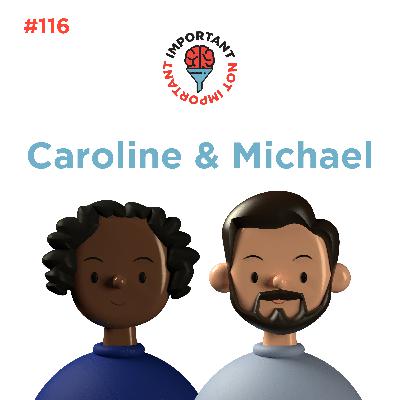
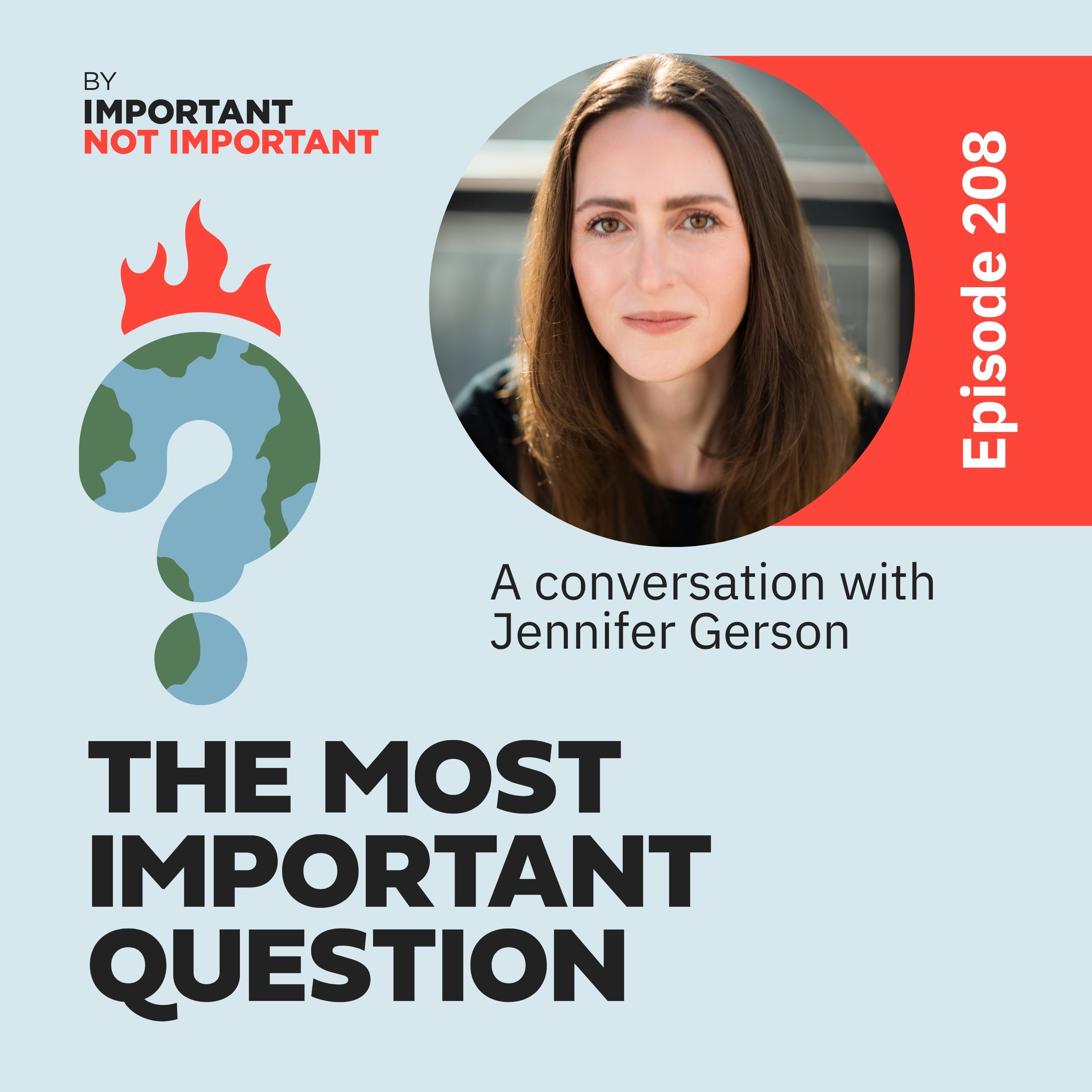
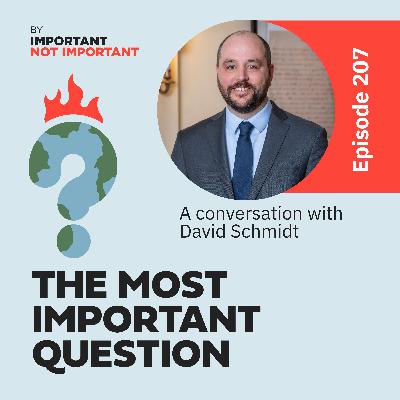
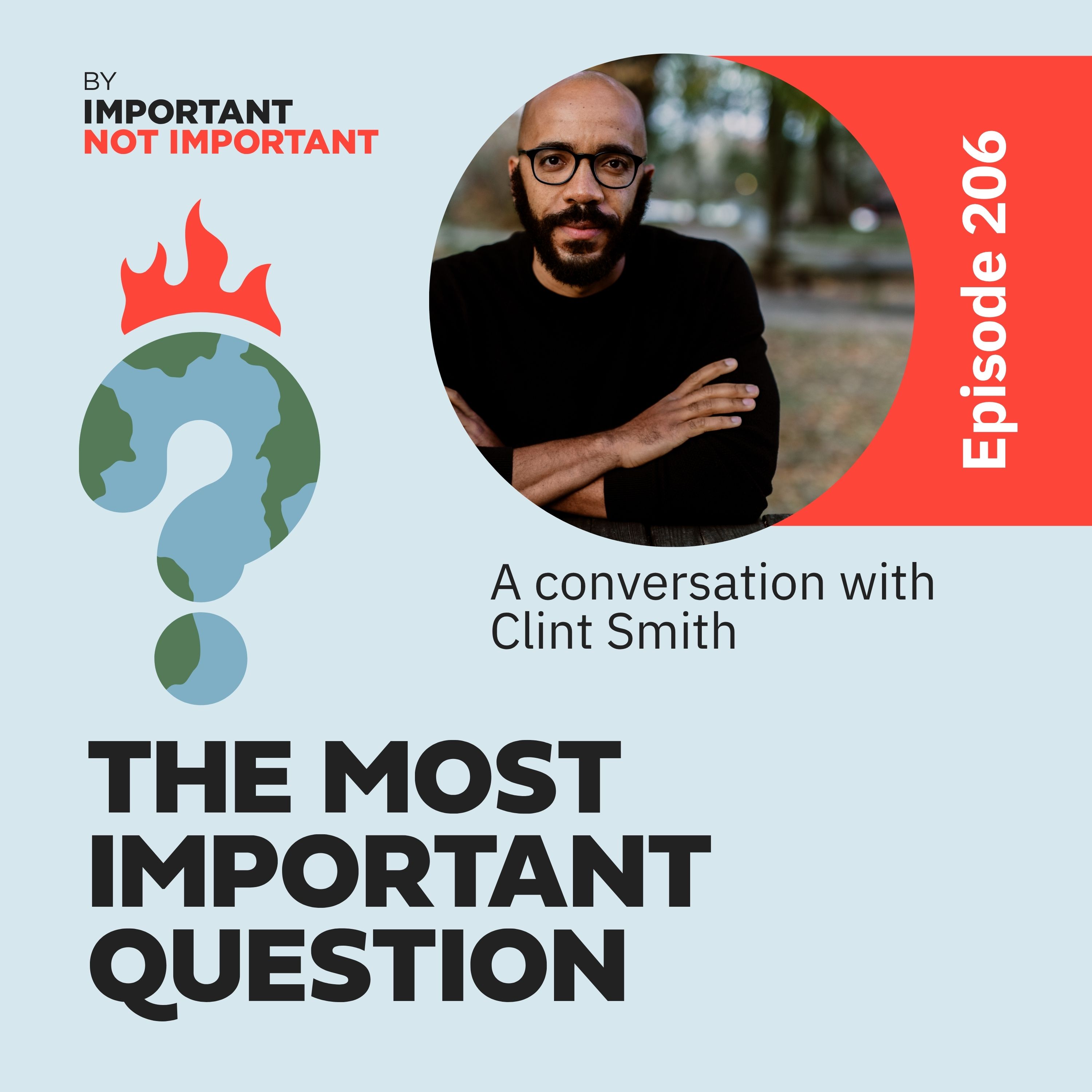
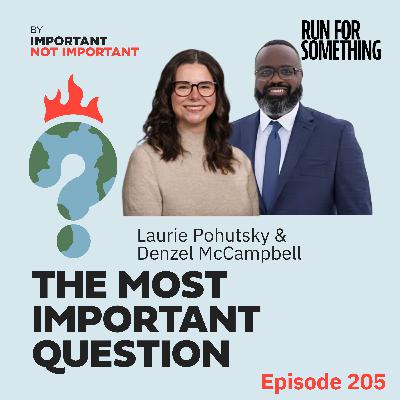
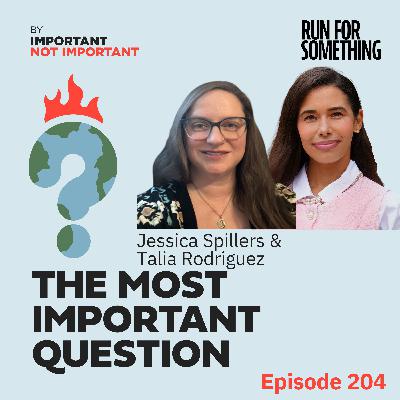
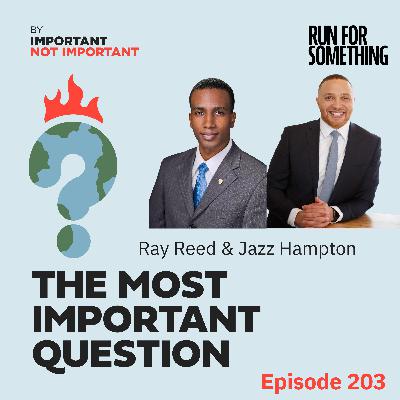
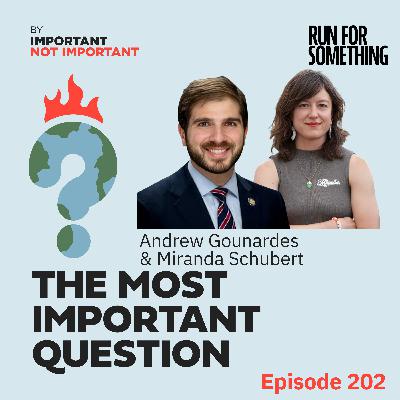
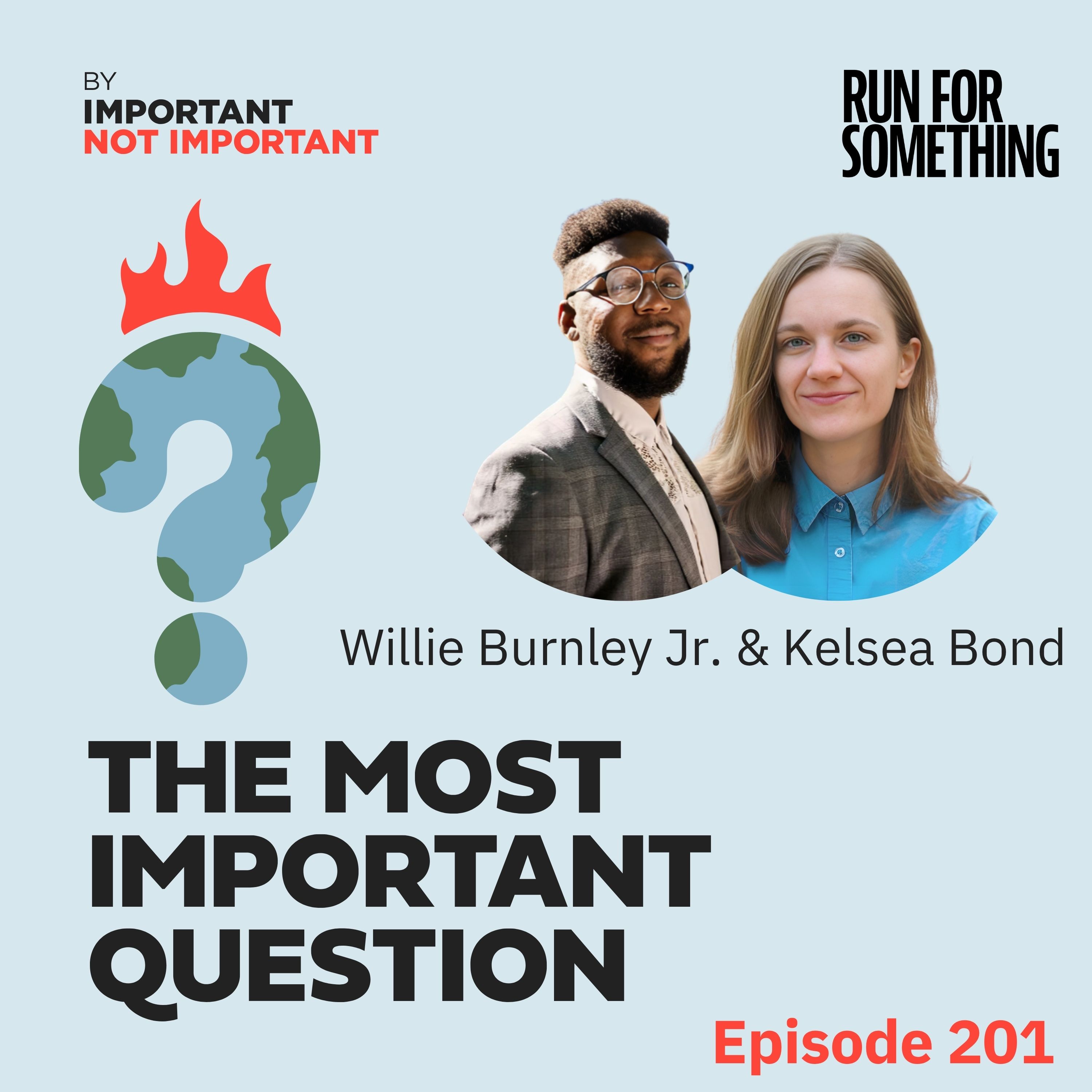
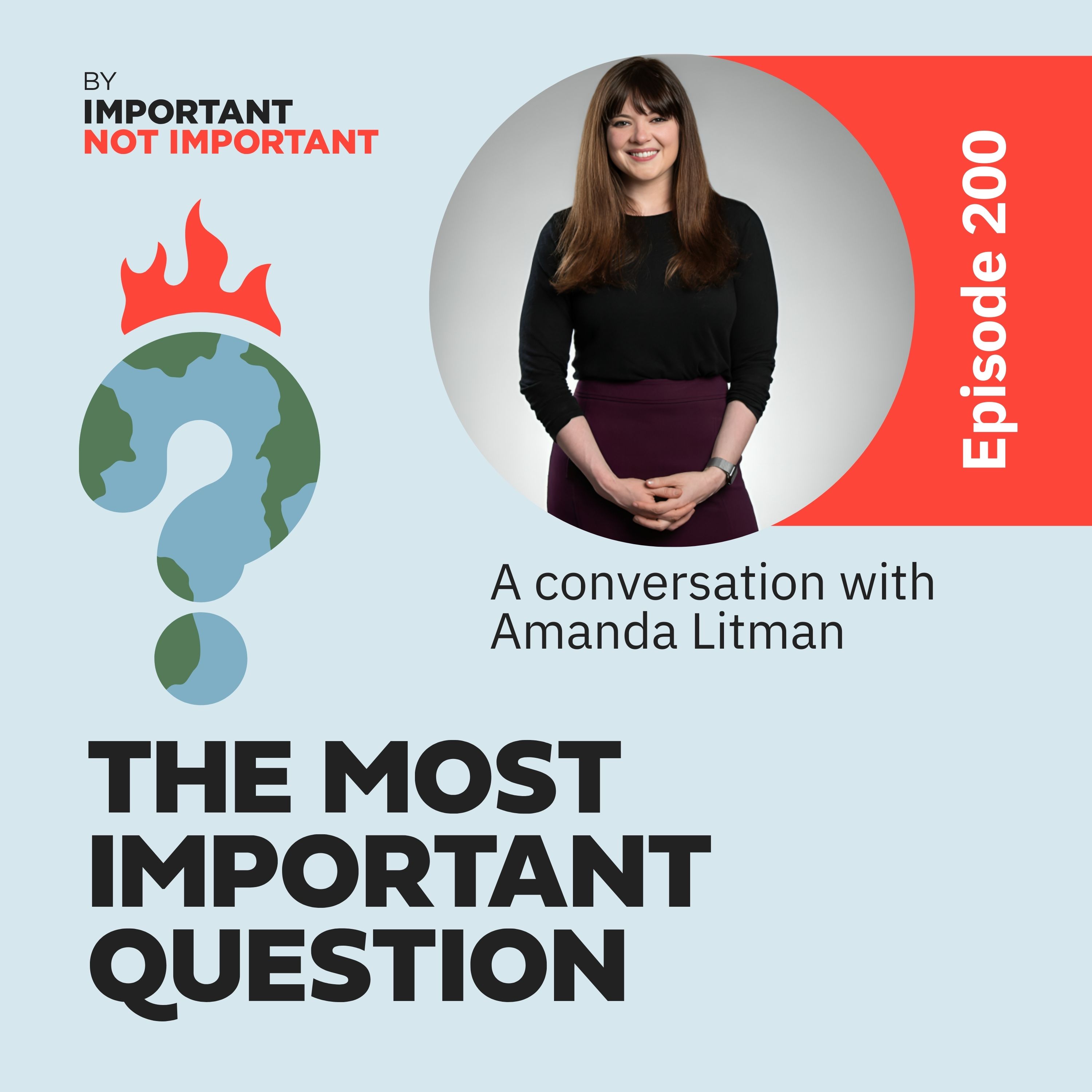
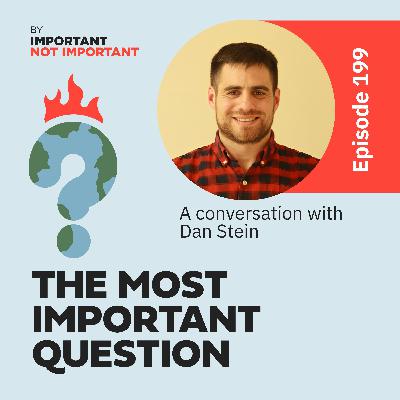
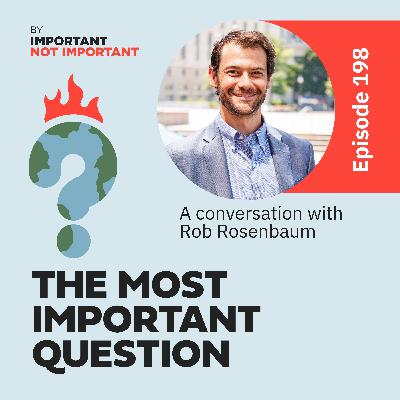
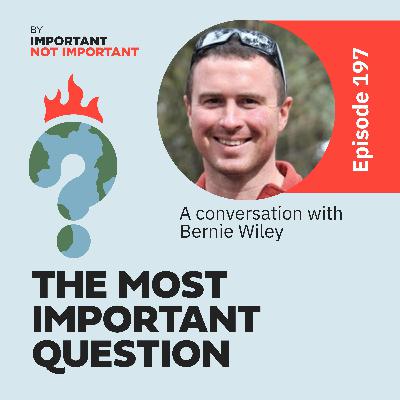






great podcast! thank you
Why spray food with stuff and ship it around the world when there are ways to grow and sell locally? Why not develop research to help farmers in harsh climates instead?
Begs the question can we speed this process up?
Terrified by what passes as truth..